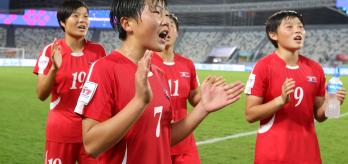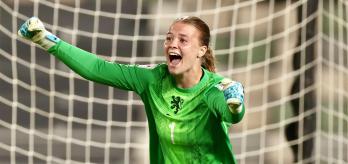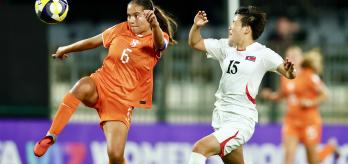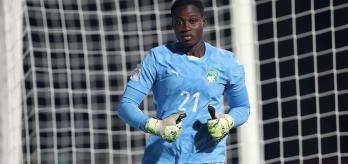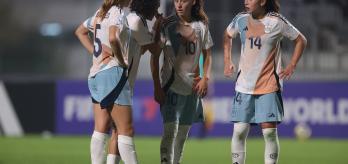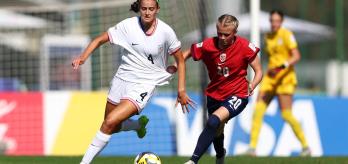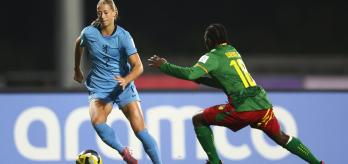Why these changes? Before 2024, the tournament only came around every two years. A biennial tournament was suitable for areas of the globe with a well-established competition schedule already in place. Girls from these regions could participate consistently in elite domestic and confederation-level competitions throughout their formative years, keeping their development on track.
However, in parts of the world without these structures in place, participating at an elite U-17 international tournament was one of the few opportunities to perform at that level – a chance that came only every two years. The lack of international opportunities in these regions resulted in a global inequality of playing opportunities. Expanding the number of teams and increasing the frequency of tournaments gives young girls from all confederations the chance to participate in qualifiers and potentially, a World Cup, on an annual basis.
The four experts forming the Technical Study Group (TSG) for the tournament in Morocco possess a blend of elite coaching experience at the youth and senior international level. The three coaches comprising the TSG have all guided a team to an international trophy. Ahead of kick-off in Rabat, we asked them several questions about their own coaching experiences, the competition’s new format and its potential developmental impact.
Technical Study Group
The new format
To create a “festival of football”, a majority of group-stage matches will be played at the Football Academy Mohammed VI, with many games being played simultaneously. What excites you about this new format?
Pascal Zuberbühler: I really love this idea — bringing so many games together at the fantastic Football Academy Mohammed VI will make it feel like one big football celebration. You can literally feel the energy when several matches happen at the same time — different styles, different emotions, all in one place.
For me, it’s also about connection: seeing young players from around the world compete, share the same space, and learn from each other. That’s the real beauty of football — passion, diversity and unity. It’s going to be a fantastic atmosphere, a true festival of the women’s game. This setup will allow our Technical Study Group and our Football Performance Insights Team to capture the full diversity of the women’s game at youth level — all in one inspiring location.
The FIFA U-17 Women’s World Cup is now an annual tournament. From your experience as a coach who has seen young players come through to the senior ranks, what impact does playing at a youth World Cup have on a girl’s senior career?
Clémentine Touré: Participating in a youth World Cup prepares players for a level of intensity, pace and tactical rigour. They face a variety of playing styles (European, Asian, African, American). This refines their tactical adaptability and understanding of the game, which promotes their footballing maturity and encourages them to become better at managing stress and pressure. Such a competition exposes young players to media pressure and the opportunity to build an international network of contacts. The players understand what is required at the highest level and adapt their training and lifestyle habits (nutrition, medical monitoring, etc.).
Professional clubs, federations and recruiters follow the World Cup, and a good performance can open doors to foreign training centres, university scholarships or professional clubs. Playing for one’s country at a young age builds pride, confidence and a sense of belonging. These players often become natural leaders of their generation. Many go on to take on key roles in the senior team, as they have already experienced the demands of wearing the national jersey.
The invaluable experiences
We often discuss the impact these competitions have on players. But what effect does an age-group World Cup have on a coach and their craft? Could it help develop more top coaches?
Mo Marley: Being part of a finals tournament offers a wealth of learning opportunities for coaches. However, the true value of these experiences often lies in how they are reflected upon both in and post-tournament.
I think individual and organisationally structured reflections, both personal and as part of a broader team review, can really add value to the coach’s development — listening to others who have had the same shared experience and seeing it from a different perspective. The post-tournament review process can directly inform future development planning for all.
The role of the coach goes far beyond just tactical preparation. In high-stakes environments like finals, everything can feel more excessive. The most effective coaches are those who guide their teams effectively while remaining curious and learners themselves.
You’ve formerly coached Japan’s U-17s, and amazingly won the FIFA U-17 Women’s World Cup in 2014. What was this experience like for you and the players?
Asako Takakura: It has been ten years since we competed in the U-17 Women’s World Cup, but it was a truly wonderful experience for both the players and me. For young players, competing on the world stage becomes an irreplaceable period. The preparation for the tournament, the awakening of national pride, the nerves during matches, the realisation that other nations are different and play differently, and the respect for others – all these aspects will profoundly influence the girls’ subsequent footballing careers as significant experiences.
You’ve also coached Japan’s U-20s and senior team. Are there any aspects, such as a national playing philosophy, that you start introducing at the U-17 level? If so, why is it important?
Asako Takakura: The philosophy and style of the Japanese team are cultivated from a much younger age than the U-17 players. While there is no single defining element, the consistency in instilling the fundamental principles essential for playing football throughout a player’s developmental journey from childhood is believed to yield positive effects. This consistency ensures the player’s own philosophy remains steadfast.
What are a coach’s priorities when working with this age group in international tournaments?
Mo Marley: Working with youth players in international tournaments presents a unique set of priorities. These players are often at the beginning of their journey, aspiring to become senior internationals. However, they may want immediate success without fully appreciating their developmental pathway. It’s important to help them understand that the senior players they admire have gone through the same process — experiencing growth, success, failure, lots of reflection, and self-exploration. Our role is to guide and support them through this journey, ideally with more opportunities and across multiple age-group tournaments.
Looking ahead to Rabat
Last year, Korea DPR won both the U-17 and U-20 Women’s World Cups. You led the TSG at both tournaments. What makes Korea DPR such a force at these levels, and do you see them carrying that form into Rabat?
Pascal Zuberbühler: What really stands out with Korea DPR is their incredible discipline and collective mindset. Every player knows exactly what her role is — they play for each other, not for themselves. You can feel that strong team spirit from the first minute to the last.
Technically, they’re very well prepared, but what impresses me most is their mentality. They never give up, they fight for every ball, and they stay unbelievably focused throughout the match. Their organisation and work ethic are exceptional — both defensively and in transition.
At youth level, that combination of structure, belief and unity makes them very difficult to beat. So, yes, I definitely see them continuing this form in Morocco. They’ve shown the world that success at these levels is not about individual stars, but about a collective mission.
Match schedule
The FIFA U-17 Women’s World Cup 2025 kicks off on Friday, 17 October, with hosts Morocco taking on Brazil at the Olympic Stadium Annex Sports Complex Prince Moulay Abdellah.
